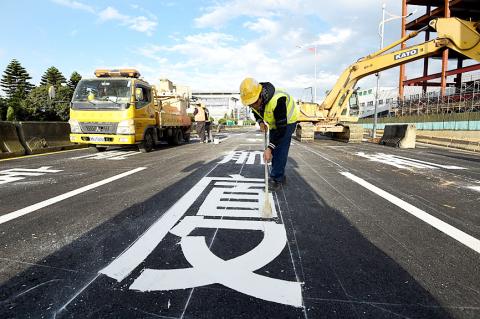The Ministry of Transportation and Communications yesterday said it is aiming to begin construction of terminal 3 at Taiwan Taoyuan International Airport in September next year and it would not remove the design for a cloud-shaped ceiling from the plan.
Deputy Minister of Transportation and Communications Chi Wen-chung (祁文中), who is also acting chairman of Taoyuan International Airport Corp (TIAC), made the statement at a meeting of the legislature’s Transportation Committee, which was reviewing the budget submitted by the airport company for the next fiscal year.
The ministry previously said it postponed completion of terminal 3 to the end of 2023 after the company twice failed to attract bidders through public-tender sessions.

Photo: Chu Pei-hsiung, Taipei Times
The postponement has added NT$3.6 billion (US$116.7 million) to the construction budget, increasing it to NT$78.2 billion, the company said.
Lawmakers in the Transportation Committee said that they were dissatisfied with repeated delays in launching construction.
Democratic Progressive Party (DPP) Legislator Chen Ming-wen (陳明文) said that the company has delayed the start of construction three times, increasing the annual budget for professional services to hire a consulting firm to help the airport company manage construction plans.
TIAC has fared poorly in its performance and its budget should be cut by NT$20 million, Chen said.
DPP legislators Cheng Pao-ching (鄭寶清) and Lee Kun-tse (李昆澤) also said that its budget should be cut.
TIAC from 2012 to 2015 received funds to pay a technical service fee to a consulting firm that helped it manage construction plans for the terminal and a third runway, and now it is seeking additional funds for a professional management fee, Cheng said.
This is an example of frivolous spending, Cheng said.
The terminal project has been divided into a contract for civil engineering work and one for building the electrical and mechanical core network, Chi said, adding that TIAC is aiming to conclude public-tender sessions for the two contracts in March.
“We are aiming to start construction in September. If the tenders in March fail, a second tender in June must succeed,” he said.
“The company does not have enough workers to complete all of the work, with the workload expected to increase in the years to come,” he said. “As hiring full-time staff would create a problem when it came time to cut personnel, it is only reasonable to outsource management of construction to a consulting firm.”
The company would work hard to achieve the best performance, Chi said.
TIAC had planned to remove a cloud-shaped ceiling — the main feature of the terminal — from the plans to shorten construction time and reduce maintenance costs, but said it would keep the design.
Maintenance of the ceiling, which is to be built with 130,000 aluminum pipes, is estimated to cost NT$1.7 billion annually.
“The ceiling would be a main feature of terminal 3 and an expression of the nation’s architectural skills. It would be a pity to abandon the design,” TIAC vice president Chen Fu-chiang (陳福將) said.
The pipes are to be made of stainless steel rather than aluminum and a special maintenance vehicle would be built to facilitate maintenance, Chen Fu-chiang said.

Alain Robert, known as the "French Spider-Man," praised Alex Honnold as exceptionally well-prepared after the US climber completed a free solo ascent of Taipei 101 yesterday. Robert said Honnold's ascent of the 508m-tall skyscraper in just more than one-and-a-half hours without using safety ropes or equipment was a remarkable achievement. "This is my life," he said in an interview conducted in French, adding that he liked the feeling of being "on the edge of danger." The 63-year-old Frenchman climbed Taipei 101 using ropes in December 2004, taking about four hours to reach the top. On a one-to-10 scale of difficulty, Robert said Taipei 101

A preclearance service to facilitate entry for people traveling to select airports in Japan would be available from Thursday next week to Feb. 25 at Taiwan Taoyuan International Airport, Taoyuan International Airport Corp (TIAC) said on Tuesday. The service was first made available to Taiwanese travelers throughout the winter vacation of 2024 and during the Lunar New Year holiday. In addition to flights to the Japanese cities of Hakodate, Asahikawa, Akita, Sendai, Niigata, Okayama, Takamatsu, Kumamoto and Kagoshima, the service would be available to travelers to Kobe and Oita. The service can be accessed by passengers of 15 flight routes operated by

Taiwanese and US defense groups are collaborating to introduce deployable, semi-autonomous manufacturing systems for drones and components in a boost to the nation’s supply chain resilience. Taiwan’s G-Tech Optroelectronics Corp subsidiary GTOC and the US’ Aerkomm Inc on Friday announced an agreement with fellow US-based Firestorm Lab to adopt the latter’s xCell, a technology featuring 3D printers fitted in 6.1m container units. The systems enable aerial platforms and parts to be produced in high volumes from dispersed nodes capable of rapid redeployment, to minimize the risk of enemy strikes and to meet field requirements, they said. Firestorm chief technology officer Ian Muceus said

MORE FALL: An investigation into one of Xi’s key cronies, part of a broader ‘anti-corruption’ drive, indicates that he might have a deep distrust in the military, an expert said China’s latest military purge underscores systemic risks in its shift from collective leadership to sole rule under Chinese President Xi Jinping (習近平), and could disrupt its chain of command and military capabilities, a national security official said yesterday. If decisionmaking within the Chinese Communist Party has become “irrational” under one-man rule, the Taiwan Strait and the regional situation must be approached with extreme caution, given unforeseen risks, they added. The anonymous official made the remarks as China’s Central Military Commission Vice Chairman Zhang Youxia (張又俠) and Joint Staff Department Chief of Staff Liu Zhenli (劉振立) were reportedly being investigated for suspected “serious